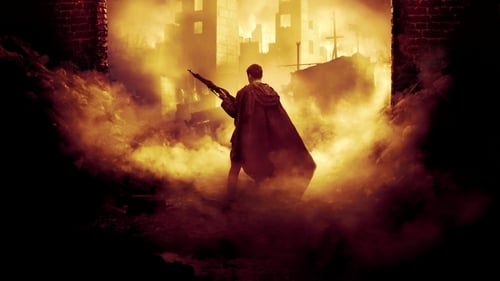Light over Koordi (1951)
Género : Drama
Tiempo de ejecución : 1H 33M
Director : Gerbert Rappaport
Sinopsis
When Paul Runge, a soldier of the Red Army, returns home to Koordi after the war, he sees that, despite the new regime, life in Koordi hasn't changed. It's still a abandoned, uncultured Estonian village, where rich landlords still oppress the population. Runge starts talking about founding a kolkhoze.

Mientras los ejércitos de Alemania y la Unión Soviética luchan encarnizadamente y el mundo espera con ansiedad el desenlace de la batalla de Stalingrado, un francotirador ruso, Vassili Zaitsev, persevera en la empresa de eliminar a sus enemigos uno por uno. Modesto y reservado, Vassili es un hombre corriente que simplemente cumple con su deber con una destreza extraordinaria. Danilov -el oficial encargado de la propaganda soviética- se da cuenta del enorme valor de este antiguo campesino, y convierte al sencillo pastor de los Urales en un héroe nacional

"Sal para Svanetia" no se parece en nada a los documentales actuales y, por tanto, la historia debe seguir una estructura y un patrón diferentes. El tema se transmite a través de intertítulos y de las tomas cinéticas y de la edición utilizada para mostrar la urgencia y el peligro dentro de la película. Con el uso de técnicas de montaje, con frecuencia se unen tomas no relacionadas para agregar a la historia y apoyar la tesis. El montaje conduce a la audiencia a través de los rituales y hábitos desconocidos de la ciudad, como el esquilado de ovejas, la confección de sombreros y los ritos funerarios. La forma en que está formateada y cortada hace que la película se perciba tanto educativa como subjetivamente, en especial con el mensaje de cómo se puede ayudar a la lucha de esta aldea con la sal para sobrevivir. En general está bellamente filmada y la elección de las tomas ayuda a crear y transmitir la idea de un pueblo desesperado y aislado que sólo podría salvarse con un nuevo gobierno.

Between 1944–1953, courageous resistance movement took place in the Baltic region of Europe, uniting the partisan troops for struggle against the Soviet Union. “The Invisible Front” was a coded name used by the Soviet Interior forces to describe the resistance movement in Lithuania. Film depicts the story of the fighters through the words and experience of the partisan leader, Juozas Luksa, and interviews with eyewitnesses of those events - both the partisans and the Soviet fighters. Tales of horror, torture and courage are told in the rare archival footage that has never been screened before, and interviews with the surviving members of the resistance movement.

Film deals with Stakhanovite movement. Old miners try to sabotage young man's plan to renew methods of getting coal.

A young Belarussian man joins Soviet partisans in order to fight Polish occupational forces in Belarus.

The propaganda documentary about the readiness of the Red Army to repulse any enemy is based on documentary shots taken during the real maneuvers of the Red Army. Armadas of tanks, immense columns of infantry, dozens of fighters and bombers, thousands of cavalry, legendary divisions of the Civil War. The film glorifies Soviet military power and shows the Soviet people what the war will be like when the imperialists attack the USSR — quick, victorious, almost bloodless.

Writers: Jaroslav Zrotal

Vladímir Ilich Uliánov, más conocido como Lenin, es recordado como el instigador de la Revolución de Octubre de 1917 y, por lo tanto, como uno de los hombres que cambió la forma del mundo en ese momento y para siempre, pero tal vez los hechos reales ocurrieron de una manera diferente a la que se narra en los libros de historia…

Film by Aleksandr Medvekin to a metonymic Chinese friend, advocating against Mao and the Ussuri River Skirmish.

Director: Vaclav Gajer

Poland in the 50s, 20th century The process of collectivization of agriculture is under way. The wealthy Slumdog farmer is one of the last individual farmers who have not joined the cooperative and are trying to grow their own land. But it is very difficult - the unemployed mercenaries who paid for them run to cooperatives (where they have better conditions), the environment or the local authorities do not accept him as a kulak. Struggling with the problem of how to make a 40-hectare farm last, he remains alone in the face of a loss of land that he cannot cultivate.

In the late 1950s, the collectivization of agriculture is in full swing in the East German village of Willshagen on the German-German border. Those in charge have to face many obstacles, especially from a large-scale farmer who is unwilling to join the co-op. All of a sudden, mysterious men in a fancy car appear in the village and show an interest in the rundown manor house. Gossip spreads quickly, and some villagers think there will be a re-parceling of properties and a land swap with West Germany. They assume everything will go back to how it used to be and even expect the count to return to his manor. In preparation, the situation in the village escalates at a fevered pitch.

When Paul Runge, a soldier of the Red Army, returns home to Koordi after the war, he sees that, despite the new regime, life in Koordi hasn't changed. It's still a abandoned, uncultured Estonian village, where rich landlords still oppress the population. Runge starts talking about founding a kolkhoze.








